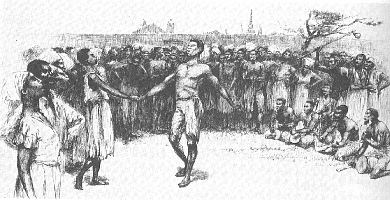After a summer break I’ll try and resume posting again. I’ll start with some ruminations about the genre of music closest to me.
As mentioned before, most of my musical activities have revolved around musical genres which can be grouped under a general category of something called “Black music”. While Black music is a common nomination for musical cultures with roots in Africa, the notion does raise some questions, some of which I’d like to discuss here.
In addition, to have been involved with Black music for most of my musical career, there was one particular incident that got me thinking of this notion more broadly and deeply. This happened at a university in Germany where I was presenting my idea for a Master’s thesis about the brass bands in New Orleans. The most discussed topic after my presentation was the notion of Black music and whether it was a racist, discriminating, and/or politically correct term.
In my studies, I have largely relied on North American literature about the music. My interests began with the history of jazz and from there to Black music in a more general sense. The choice of literature has also been affected by my language skills, as well as the institutional preferences at the Musicology department of the University of Amsterdam.
The academic discourse about Black music has gone more or less hand-in-hand with the general discourse in terms of terminology. One of the most significant publications in the field, Black Music Research Journal started in 1980. In the largest online repository of academic publications, JSTOR this journal is listed under the topic of African American Studies. Among others, the list of journals there include Journal of African American History, Black Perspective in Music, and the Journal of Negro Education. It’s notable that the first of these was originally called Journal of Negro History (1916-2001) but the last is still in publication using the original name (since 1932).
Thus, it seems that the academic community – at least on that side of the bond – is rather heterogeneous in their terminology in this regard. But let’s turn back to music and what this terminology implies in terms of music and musical practices.
Can music be black? – Some musical markers
The notion of “Black music” would seem to indicate that there’s something specific in the music – as a “sound object” – that makes it “black” as opposed to some other colour, i.e. it points at an ethnicity or a race. What could such musical elements be? With the risk of simplifying and essentialising matters, I’m going to use a bit of comparative methodology here.
Revealing my cultural background and point of view, I’ll take – rather stereotypically – as a point of comparison the western classical music. The most striking difference between western classical music and most Black music genres is the use of rhythm. The most distinct feature of such contemporary genres as jazz, blues, R&B, reggae, samba, salsa, etc. is their rhythmic character; swing, groove, tumbao, whatever it’s called in a particular genre. One could also argue that the frequent use of pentatonic scales with some unstable “blue notes” is distinct to Black music genres. Harmony has for so long been in the centre of western classical music that it has for a long time been difficult, if not impossible, to do anything new on that area. It could, however, be argued that harmonising the above-mentioned scales and fixing those unstable inflections into chords corresponds with the (Black) aesthetic of the music and results in harmonies – while nothing new on paper – are characteristic to these genres. Blues is a prime example of this as the use of a dominant chord on all degrees (I, IV, V) undermine the conventional function of this chord, resulting in a distinct “blues tonality”.
Each genre also tends to have its characteristic instrumentation; violin strongly implies classical music – although violin or similar instruments have always been used in popular music as well – saxophone or trumpet are often used to signify jazz in e.g. festival posters and album covers, electric guitar and drums refer to pop/rock, and so on and so forth. Performance venues are also markers for genres, albeit broad ones. You don’t have a symphony orchestra playing in a bar or a heavy metal band in a concert hall. Only due to the acoustics of these venues such performances would not be successful, but also in other ways the music would mostly likely seem to be quite “out of place”, in a very literal sense.
I’ll come back to these aspects later when I take the discussion to a more concrete level with some more specific examples.
Music as discourse
So there are some musical and physical, or extra-musical, markers suggestive of a musical genre. But what do these have to do with any sort of racial or ethnic label or claim on music? Quite a lot, in fact. Music, like any other art form, is used to express, communicate, share and live various, more or less specific, socio-cultural experiences. As such, these artistic processes are part of the ever-continuing discourse about the human condition.
Music has also the benefit, and challenge, of being the most abstract of the art forms. Referentiality or any kind of “meaning” in instrumental music is a very complicated notion and highly malleable depending on various contextual factors. Shortly, it’s quite difficult, if not impossible, to put a finger on the references or “meanings” of a piece of instrumental music. In most cases, there are several semantic layers and various possible interpretations.
To call some music “Black” – or any other such label or category – then is to claim that it has some specific relation to a specific group of people. We are, thus, dealing with a discourse about identity with various cultural, social, political, etc. dimensions. And this is essentially a musical discourse; while a lot has been – and will be – said about music in this regard, the really meaningful discourse takes place in the music itself; the ways in which people make and use music. To give this a Heideggerian twist, we cannot perceive/experience music as a “sound object” without our subjective interpretation colouring the experience with connotations and meanings, i.e. there’s no Music (with a capital M) without extra-musical elements and dimensions (begging the question whether “extra-musical” is a valid notion).
I’ll leave it at this for now. Next time I’ll take a more concrete approach to the matter and discuss jazz as Black music and the discourse around the topic. I’ll bring along some other, more renowned, commentators on the matter and also discuss an aspect I haven’t touched yet: What does the “Black” in Black music actually stand for?

